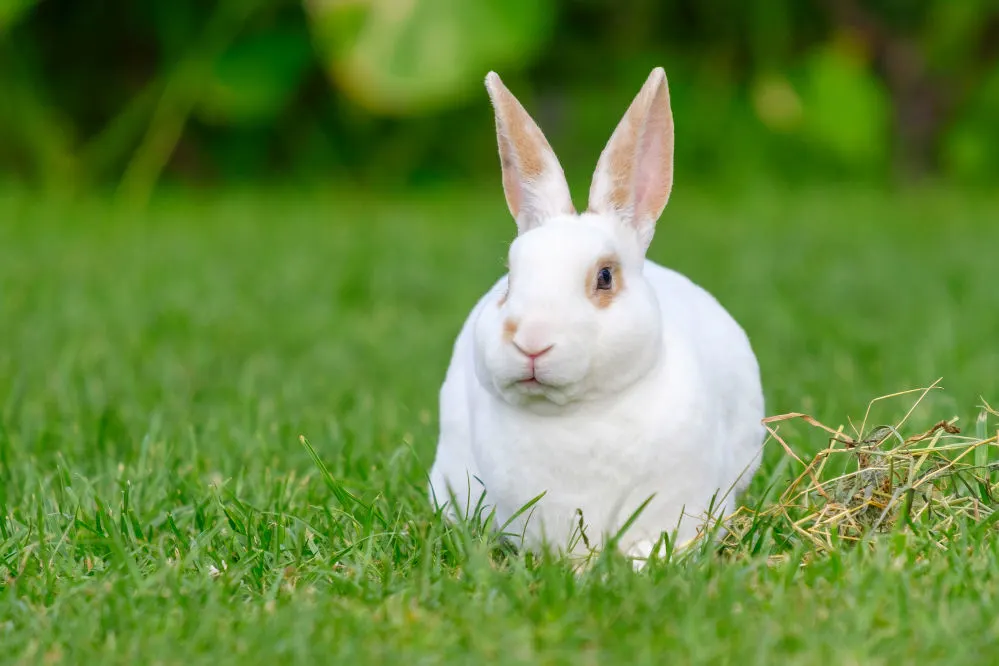Adopting a new furry friend can be nerve-wracking and sometimes overwhelming for most rabbit owners. You start to wonder about many things. How do you keep a rabbit safe and healthy?
While you’ll learn a lot about your pet through trial and error, remember that all rabbit breeds aren’t the same. Some may have different needs than others, so research is always an excellent way to make you a better bunny parent.
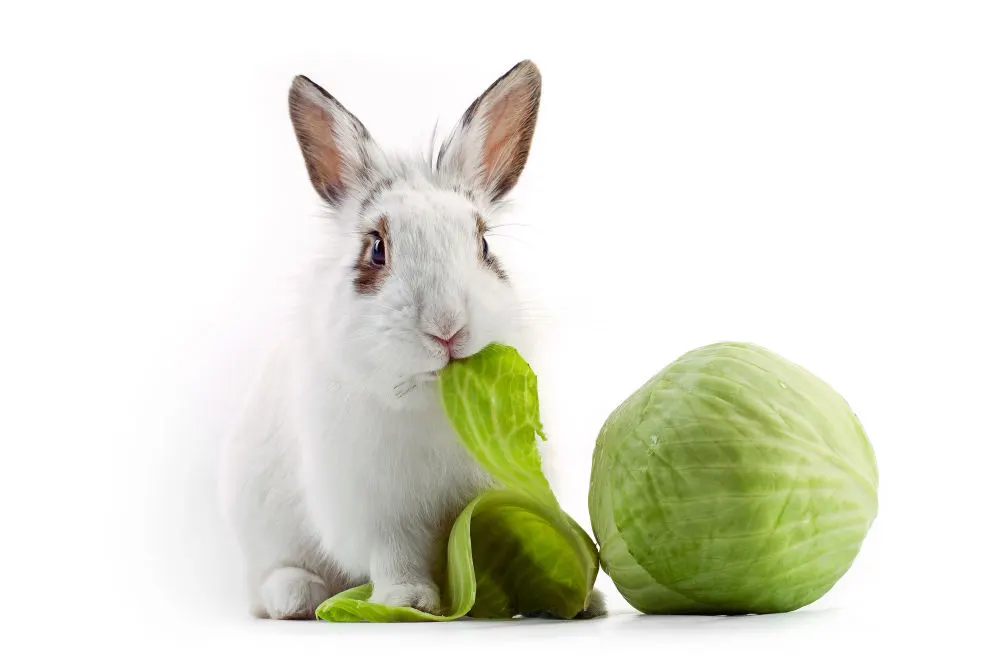
One thing all rabbits have in common is that they need to be on a proper diet with plentiful essential nutrients to flourish. However, many pet owners tend to overfeed their furballs because they seem to never get full.
So, can you overfeed a rabbit? This guide will reveal everything you need to know, from health issues to foods you should avoid.
Is it possible to overfeed a rabbit?
Short answer; yes, it’s possible to overfeed your little bunny. This happens when your rabbit is given a chance to overeat, so you must be diligent and precise with their daily diet. Unlike dogs or cats, bunnies hardly know their limit when it comes to food.
If possible, rabbits will eat numerous times throughout the day and only stop once they are satisfied and want to play or rest. You need to have a proper eating plan to ensure your furry friend gets all the daily fiber and nutrients needed to be healthy and in shape. If you overdo it and provide too much food, your rabbit won’t say no and will eat away.
You don’t want that to happen as an overweight or obese rabbit means you’ll have to deal with a lot of health complications that come with it. The health risks associated with overeating are further below, so keep reading.
Should a bunny eat all day?
Indoor rabbits are natural grazers, meaning they eat continuously. It’s important to know that rabbits are nibblers, so you should try and provide them with food throughout the day.
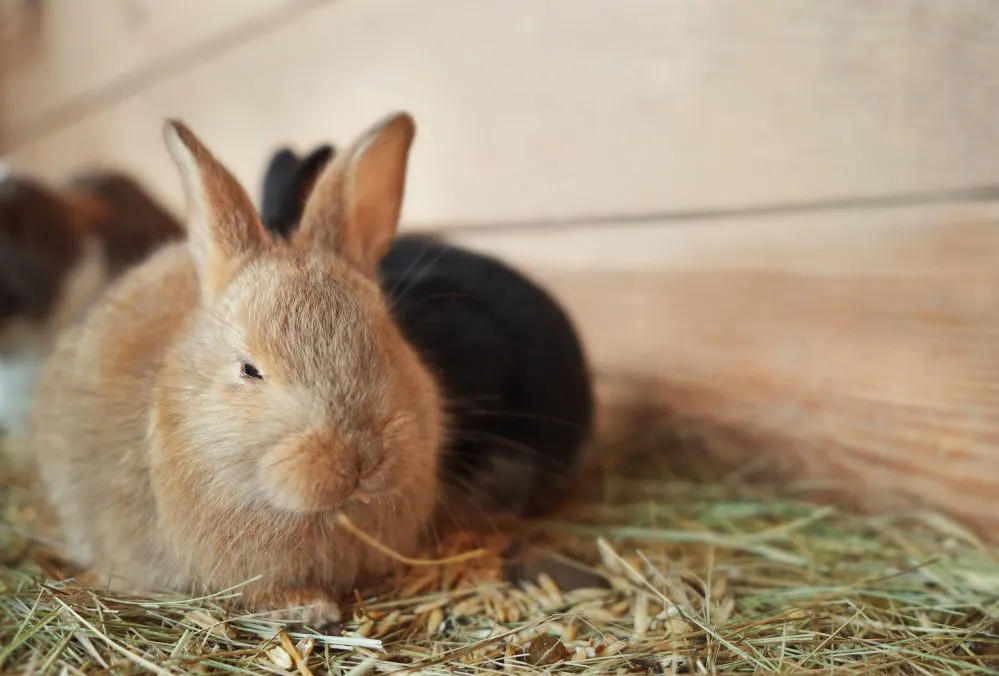
This means giving certain things rabbits could munch on all day without negatively impacting their health, like fresh hay or grass. However, there are certain foods like vegetables and pellets that you’d want to limit to prevent obesity and other medical issues related to overeating.
What should you feed a rabbit to prevent overeating?
By now, you know that rabbits want to nibble all the time. Instead of overfeeding them by leaving out fresh foods and pellets for the entire day, provide your pet with unlimited hay and fresh water. Hay is an excellent source of fiber and the only food that needs no limit and will keep your bunny happy.
It’s not always practical to have a bunch of hay lying around, especially if your home is small and you want to keep things tidy. Alternatively, you can use chew toys so they don’t have to stop munching away. This is vital since your rabbits’ teeth never stop growing, so if they stop chewing, they’ll end up with serious medical issues.
What does a balanced diet for domestic rabbits look like?
For the best diet, you want to ensure that your rabbit’s daily intake involves fiber-rich foods with excellent nutritional value.
A healthy diet should contain the following:
- Unlimited hay: About 80% of a bunny’s diet should have grass hay such as timothy hay, orchard hay, and meadow hay.
- Fresh Veggies: Large rabbits should take in about two cups of washed leafy greens such as broccoli, cabbage, romaine lettuce, celery, bok choy, carrot tops, dark green lettuce, and iceberg lettuce per day. Dwarf breeds under five lbs (2.26 kg) should have no more than one cup of the leafy greens mentioned. You can feed them vegetables once or twice daily.
- Fresh, clean water: Rabbits should have access to drinkable water 24/7.
- Small quantities of fresh fruit: You can treat your pet to an occasional fruity snack.
- Pellets: Give your rabbit one ounce per one lb (28.34 grams per 0.45 kg) of their body weight’s worth of pellets daily. Avoid exceeding this amount, as too many pellets can cause issues in a rabbit’s digestive system.
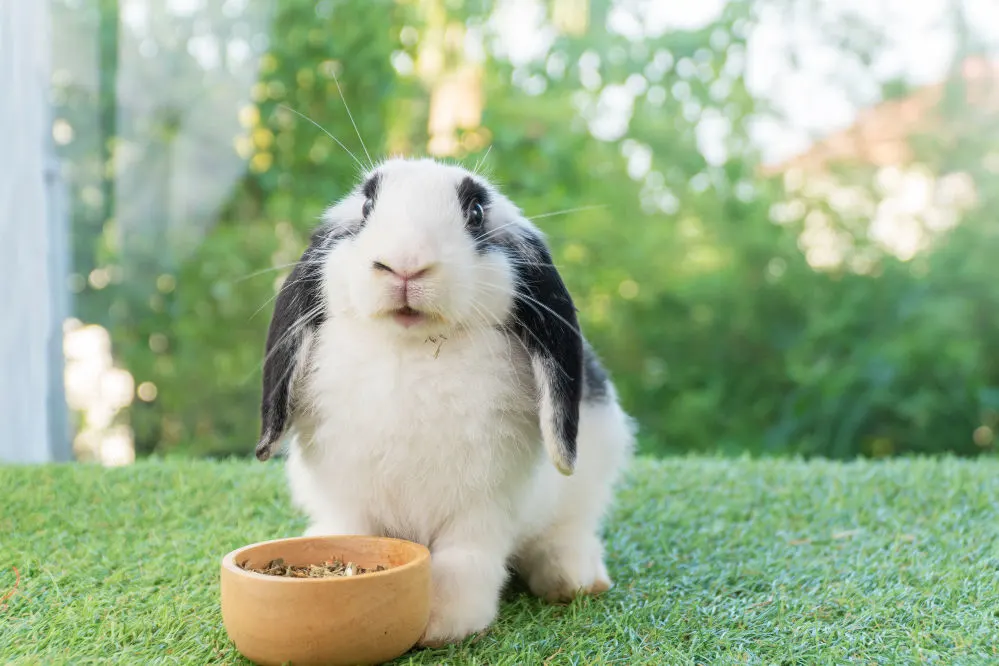
Next Read: What are rabbit pellets made of?
How to avoid overfeeding rabbits: most common mistakes when it comes to feeding rabbits
Overfeeding is one of the most common mistakes made by rabbit owners. If you’re worried that you might overfeed your rabbit, you can start by avoiding the following things:
1. Feeding adult rabbits the same as young bunnies or vice versa
Like any other pet, your rabbit’s age determines its dietary needs. A baby rabbit will start eating small portions of select foods such as alfalfa hay and pellets.
Once they start growing, they’ll require larger portions of various foods such as fresh vegetables, timothy hay, pellets, etc. This is when you can experiment a bit to see what your growing bun-bun takes to or what they don’t like.
When they’ve matured, you can narrow the menu to a basic, nutritional diet to keep your older rabbit happy. You’ll start by limiting dry pellets and fruits, sticking primarily with various grass hay and fresh greens.
2. Giving your bunny too many fresh fruits
Fruits should be given in limited quantities. See it as an occasional treat and nothing more. The high sugar content in fruit is not ideal for healthy rabbits.
Too much sugar can result in digestive issues and tooth decay for your rabbit. You can give your bun fruit once or twice weekly and try to stay within this amount. Serve these sweet treats as one to two tablespoons per five pounds (2.26 kg) of body weight.
Remember not to give kittens (baby rabbits) fruit until they’re 12 weeks old or have been weaned off their mother’s milk.
Next Up: Can rabbits have strawberry tops?
3. Your pet rabbit consumes too many dry pellets
Many bunny owners make the mistake of feeding their pet way too many pellets. Rabbit pellets are made from plants, alfalfa meal, and middlings. While these ingredients are great for a growing bunny, they can harm your older rabbit’s health if given excessively. The ideal amount would be just below one ounce per one lb (28.34 grams per 0.45 kg) of your rabbit’s body weight.
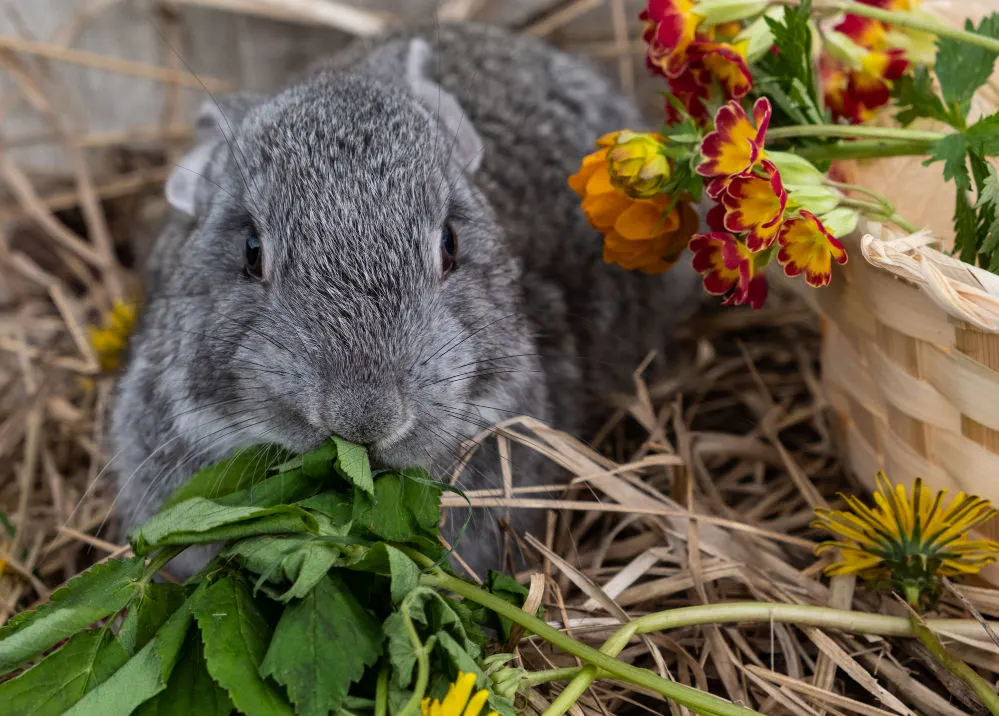
4. You’re not providing enough hay or grass
It’s always best to try and replicate a wild rabbit’s diet when feeding your furry baby. The most accurate thing you can do is provide them unlimited access to hay and grass.
5. Your rabbit’s diet has large quantities of carbs and low fiber
Gastrointestinal Stasis, or simply GI stasis, is an issue in a rabbit’s digestive system caused by a lack of fiber and too much carbohydrates. It’s one of the most common disorders in pet rabbits caused by an inappropriate diet.
Feeding older rabbits too much alfalfa-based food, overfeeding pellets, and giving your pet the wrong foods can all lead to this disease.
6. The portion sizes are incorrect
Portion sizes are important when feeding your fuzzball. Giving them too much food at a time is where lots of bunny parents go wrong. Have a look at this rabbit feeding guide to help you determine how much you should feed your rabbit according to its size.
Alternatively, you can ask your vet for advice on feeding portions.
7. You feed your bunny too many leafy greens
While leafy greens are essential to a rabbit’s diet, certain greens should be fed in smaller amounts. This includes dandelion greens, kale, Swiss chard, parsley, and collard. These foods contain a high amount of calcium that can form bladder stones if given in excess.
Foods to avoid feeding your rabbit
While some foods should be limited for rabbits, there are some that you shouldn’t feed them at all. Here’s a list of foods to avoid at all costs:
- Beans
- Nuts
- Seeds
- Grains
- Cereals
- Bread
- Biscuits/cookies
- Peas
- Sweets/sugar
- Corn
- Chocolate
How dangerous is it to overfeed a rabbit?
Let’s look at how dangerous it can be to overfeed your rabbit.
How do you know your rabbit is overweight?
First, you need to figure out if your rabbit is overfed. Obese rabbits will have fatty pads on their groins, shoulders, and legs. You should be able to feel your bunny’s ribs and spine when petting them firmly.
Also, if you notice that your bunny is much broader than they are long, it could mean your pet is seriously overweight.
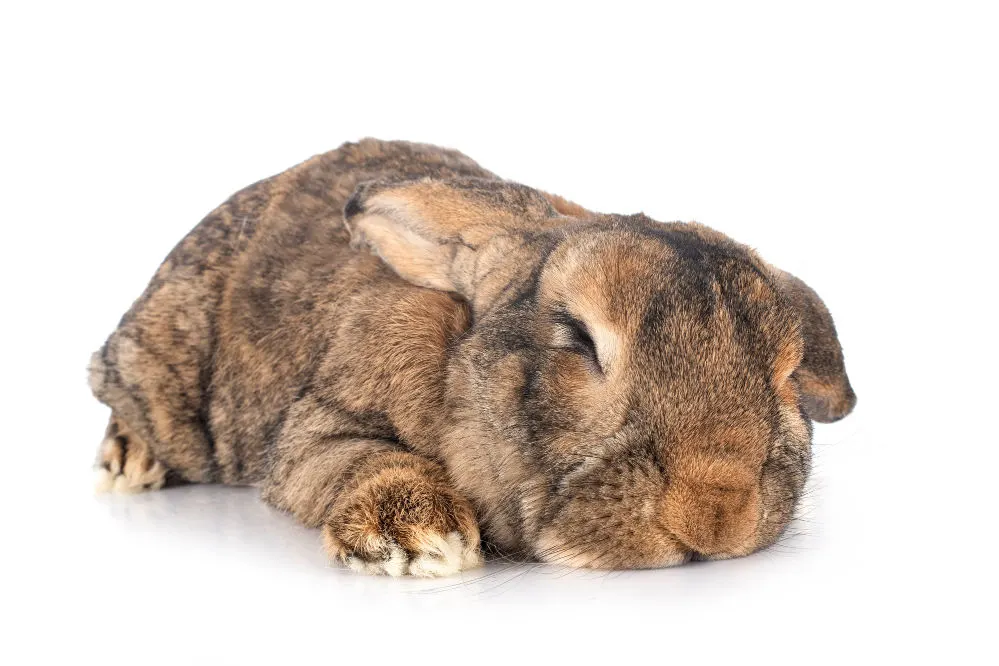
Averaged-sized house rabbits roughly weigh around six pounds (2.72 kg), while smaller breeds or dwarfs can weigh as little as four pounds (1.81 kg). Giant breeds can weigh 10-15 pounds(4.53-6.8 kg) and sometimes up to 20 pounds (9 kg).
Tip: If you’re still unsure, you can always consult your veterinarian, and they’ll weigh your rabbit for you.
Read Next: How big do Flemish giant rabbits get?
Health problems associated with overfeeding your bunny
Numerous health issues may arise due to rabbits overeating. Here are some of the most common diseases and illnesses that result from excessive weight gain:
Obesity
Overeating can quickly lead to obesity in rabbits. Obesity in rabbits should not be taken lightly, as it leads to many problems, such as insulin resistance, hepatic lipidosis (liver disease), osteoarthritis, atherosclerosis, and pododermatitis.
There are more health issues related to obesity:
- Cardiovascular diseases
- Arthritis
- Flystrike (a condition caused by flies laying eggs on a rabbit’s body due to lack of grooming).
- Skin ailments such as infections and urine scalding
- High blood pressure
- Cancers
- Diabetes
- Respiratory distress
Can rabbits die from overeating?
Yes, unfortunately, they can end up dying from complications caused by obesity and digestive problems. Obesity is a severe condition since rabbits have such sensitive digestive systems. These complications will require medical intervention, so visit your local vet if you notice excessive weight gain in your bunny rabbit.
FAQs on can you overfeed a rabbit?
Here are a few questions you may need an answer to.
Do rabbits stop eating when they are full?
Rabbits will only stop eating once they are satisfied, depending on the type of food, the rabbit’s size, and even the time of day. They’ll take a break here and there to rest or play, but generally, a rabbit will nibble throughout the day.
Should I let my bunny eat all day?
By now, you know that rabbits can develop a dangerous case of obesity if given too much food. At the same time, they should nibble quite a lot to have healthy teeth. The best option is to provide unlimited grass hay so your pet can graze away as a wild bunny would.
How much should a rabbit eat per day?
Feeding your rabbit fresh foods twice daily should be enough. You can measure the veggies or fruits at a minimum of one heaped cup per five lbs (2.26 kg) of your pet’s body weight.
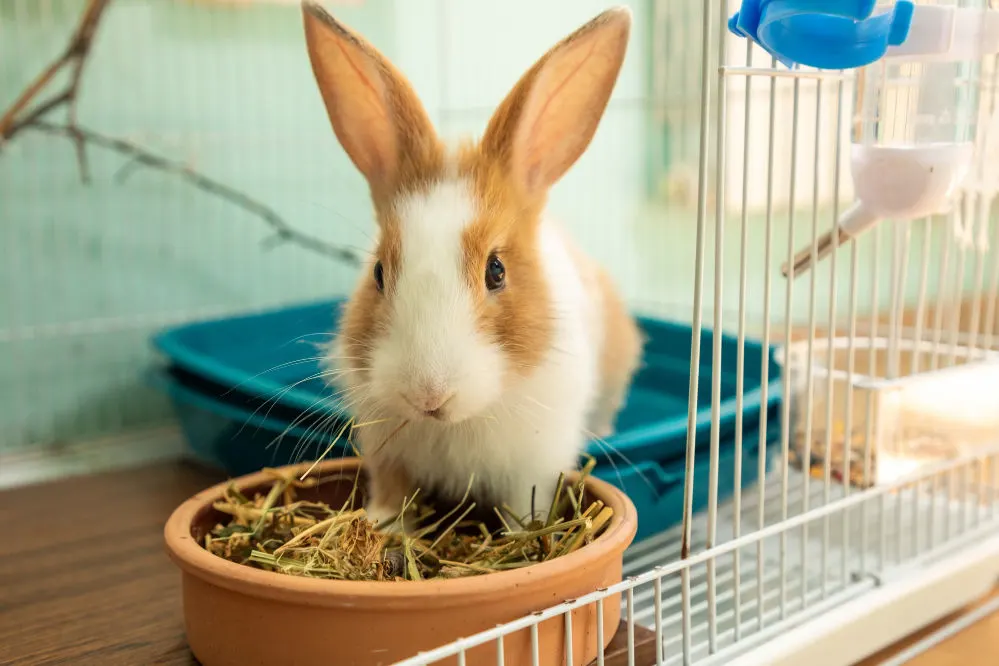
Should I leave food out for my rabbit at night?
This is not a good idea if you’re training your rabbit to adapt more to your sleeping schedule. In addition, your bunny will most likely eat its own ‘homemade’ cecotropes or cecal pellets during the evening and night. Doing so might also increase undesired behaviors as you’re trying to sleep, such as chewing.
Read Next: When do rabbits sleep?
Can you overfeed a rabbit? Wrapped up
Overfeeding your pet bun-bun is a possibility, but one you certainly want to try and avoid. While rabbits can eat all day, make sure they’re eating high-quality, fresh hay. Otherwise, providing them with inappropriate portions of vegetables, fruits, and pellets will lead to unpleasant health consequences.
The best thing you can do as a bunny parent is to stick to feeding your adorable pet a balanced diet (which you now know the basics for) and do regular checkups with your vet. Keep an eye on your bun, feed them well, and you should be good to go.
Next Up: Can you use cat litter for rabbits?
Steph Dyson is a travel journalist by trade but a lover of all small pets. She’s been a pet mum to everything from gerbils to guinea pigs, rabbits to hamsters, and fish to dogs of all shapes and sizes. She wants to share her years of experience with small pets and make Small Pet Guides the go-to website for pet owners seeking information and care advice.

